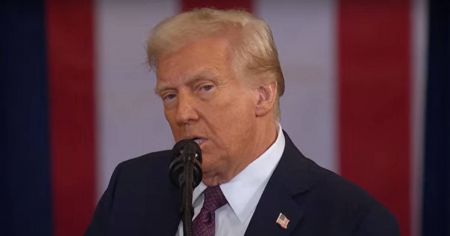The President of the United States, Donald Trump, celebrated this Friday the release of six American citizens who were detained in Venezuela.
Through his X account (formerly Twitter), the former president expressed his joy at the return of the hostages and thanked his team for securing their release.
"I have just been informed that we will be bringing six hostages from Venezuela home. Thanks to Ric Grenell and all my staff. Great job!" Trump wrote in his message, referring to Richard Grenell, his special envoy in Venezuela.
Grenell, who was in charge of the operation, confirmed the news through his social media, where he shared a photo with the released citizens inside the plane that would take them back to the United States. "We are on our way home with these six American citizens. They just spoke with @realDonaldTrump and couldn't stop thanking him," the diplomat posted.
So far, the identities of those released by the regime of Nicolás Maduro have not been revealed, nor the conditions in which they were detained.
It is also unclear how many American citizens remain detained in Venezuela, although some sources have estimated that there could be at least nine. According to the Colombian media Semana, the Maduro government has accused several of them of terrorism and being alleged “high-level mercenaries.”
Mauricio Claver-Carone, the U.S. Special Envoy to Latin America, demanded the immediate release of the remaining American prisoners. “The American hostages being held in Venezuela must be released immediately,” he stated, emphasizing that the meeting between Grenell and Maduro "was not a negotiation in exchange for anything."
This is not the first time the Venezuelan regime has released American prisoners. In 2023, after months of negotiations, Maduro allowed the release of 10 Americans, while the United States freed Alex Saab, a Colombian businessman and alleged frontman for the Venezuelan leader.
From the White House, press secretary Karoline Leavitt made it clear that this approach does not imply an official recognition of Maduro as the legitimate president of Venezuela, emphasizing that Washington's stance on the Chavista leader has not changed.
Context of the Meeting between Grenell and Maduro
Trump's envoy to Venezuela, Richard Grenell, met with Nicolás Maduro on Friday, January 31, and announced his return to the United States with the six released citizens. The meeting took place at the Miraflores Palace and was broadcast on Venezuelan state television.
According to a statement from the Chavista regime, the meeting was requested by the White House with the aim of initiating a "new beginning in bilateral relations."
According to the mentioned Colombian media outlet, the Maduro regime indicated that the discussion covered topics such as migration, the impact of economic sanctions on Venezuela, and the situation of American citizens detained in the South American country.
Despite the conciliatory tone of the statement, the relationship between the United States and Venezuela remains tense. Washington continues to impose economic sanctions against the Chavista dictatorship and does not recognize the legitimacy of Maduro's government. During his first term, Trump labeled the 2018 elections in Venezuela as fraudulent and openly supported the opposition.
The meeting also takes place in the context of the Venezuelan migration crisis. Millions of citizens have left the country in search of better living conditions, a situation that has generated political tensions in the United States, where Trump has proposed strict measures against the illegal migration of Venezuelans, including the deportation of those linked to criminal groups such as the Tren de Aragua.
Moreover, the Trump administration recently signed a decree authorizing the use of the Guantanamo military detention center for the incarceration of irregular migrants, a decision that has sparked controversy in international public opinion.
On the other hand, the White House has insisted that Grenell's negotiations with Maduro do not involve concessions from the United States. Washington has warned that it will continue to push for free and fair elections in Venezuela and for the human rights of citizens to be respected.
The situation remains uncertain, and it remains to be seen whether this meeting will signify a real change in the relationship between the two countries or if it was merely a diplomatic gesture amid the political and economic tensions surrounding Maduro's regime.
Filed under:
